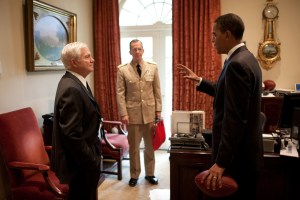President Obama’s fight to let openly gay men and women serve in the U.S. military enters its political endgame this week. The Pentagon will release its report on Tuesday saying most troops don’t care, and Defense Secretary Robert Gates and Adm. Mike Mullen, chairman of the Joint Chiefs, will tell the Senate Armed Services Committee on Thursday they’re ready to lift the ban. The only bump in the road is likely to come on Friday, when the other five members of the Joint Chiefs — some of whom have voiced opposition to the change — will testify before the Senate panel. But if Senate and Pentagon leaders get their way, a Senate vote on lifting the 17-year old policy, a move the House took in May, could come as early as next week.

Gates, Mullen and Obama all support ending "Don't Ask, Don't Tell" / White House photo
The showdown hearings are sure to be high Washington theater, with a sprinkling of camera-loving protests possible. Each side will be marshaling whatever evidence it can pull out of the year-long Pentagon review to buttress its argument. Lawmakers will ask supporters of lifting the ban how sure they are that a change in the law wouldn’t harm unit readiness. They’ll ask opponents to justify their stance in light of President Harry Truman’s unilateral order racially-integrating the ranks and asked why the believe the world’s finest fighting force can’t handle the repeal.
Sunday’s talk shows offered a preview from members of the Senate Armed Services Committee. “We don’t have a problem,” John McCain, the Arizona Republican who has become a chief defender of “Don’t Ask, Don’t Tell” in recent months, said on CNN Sunday. Rather, the push to end the policy is about a “political promise made by an inexperienced president, or candidate for president, of the United States.” He added that the need to preserve the U.S. military’s fighting edge is “why people like the commandant of the Marine Corps has come out against repeal.”
A Democratic colleague disagreed. “Gay members of the military have served for decades and there hasn’t been a problem with our military being the finest in the world,” said Senator Claire McCaskill of Missouri, on Fox. “We should move forward to make sure that any person who stands up and says, `I’m willing to die for our country’ can do so with honor.”
Gay advocacy groups are looking forward to the Defense Department study. “After senators are presented with the Pentagon report on November 30th, it is the overall content of the report that must drive and inform the next steps in this process, not political maneuvering based on bits of data cherry-picked by anti-gay politicians and groups and employed as smokescreens to obscure the report’s broader conclusions,” says Aaron Belkin, director of the University of California at Santa Barbara’s Palm Center, a think tank that wants the ban lifted. “The military’s rationale to continue firing good troops who happen to be gay or lesbian is finally coming to an historic end, thanks to this report.”
Actually, the ban on gays serving in the military seems to be withering on its own, regardless of congressional inaction. Gates pledged in March to enforce the policy in a “more humane” manner by restricting how gays could be kicked out. Then, in October he tightened its implementation even more by requiring ousters be approved by Obama-appointed civilian Pentagon leaders.
The task force investigating troop attitudes towards gays in uniforms will also detail the Pentagon’s preferred approach to the various issues — barracks and benefits, largely — that will have to be tweaked to integrate openly gay men and lesbians into the armed forces. Opponents are likely focus on changes that they contend will hurt morale and, in turn, blunt the combat effectiveness of the nation’s military.
The concern among gay advocates and lawmakers supporting an end to the ban is that the focus on griping by some troops only serves to polarize the issue and encourage opponents to scream louder in opposition. Gates has written to lawmakers reminding them that the U.S. military — while it defends democracy — is not a democracy. “I do not believe military policy decisions on this or any other subject,” the defense chief said, “should be made through a referendum of service members.”


